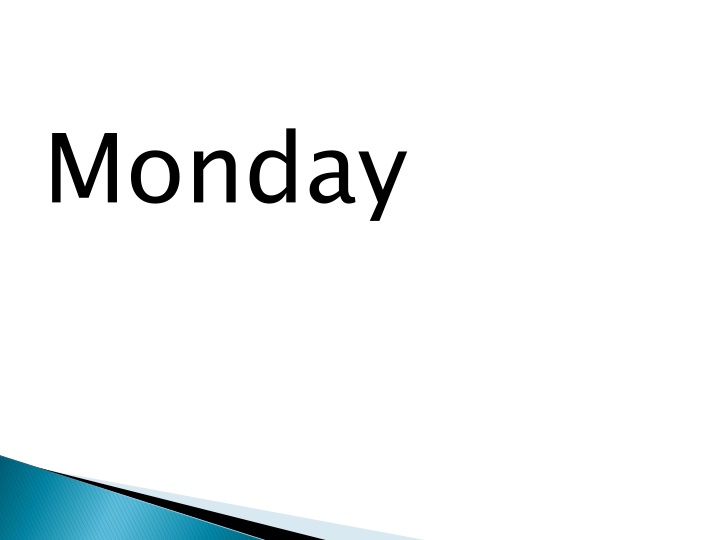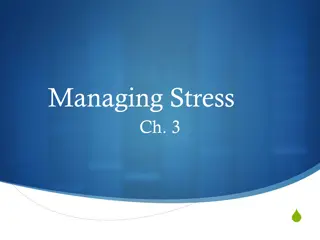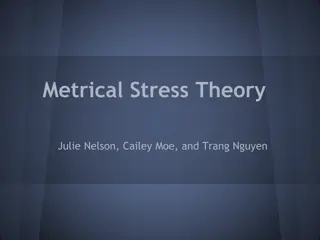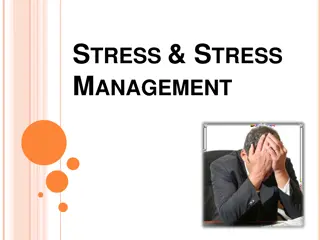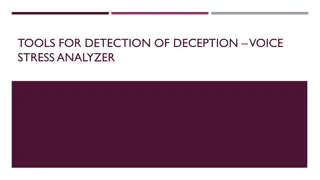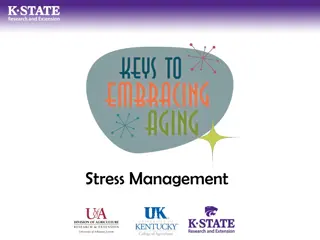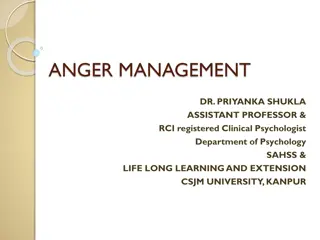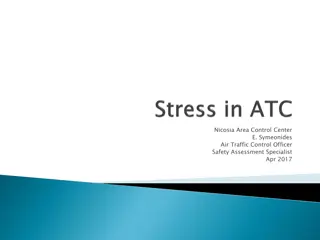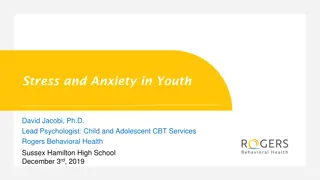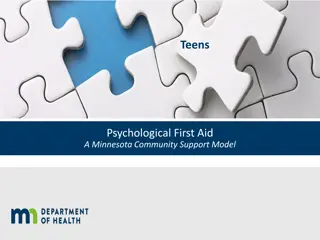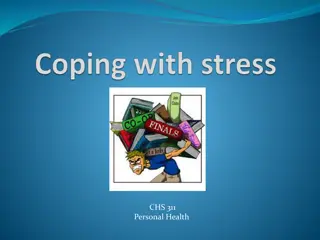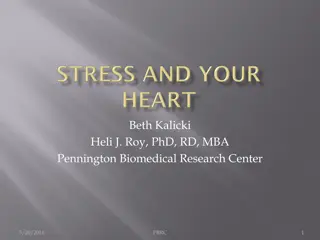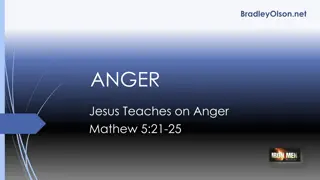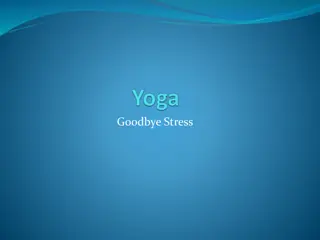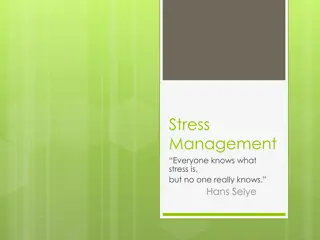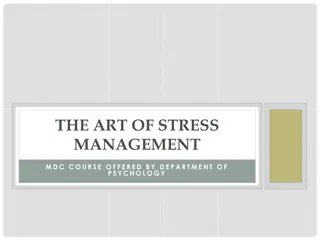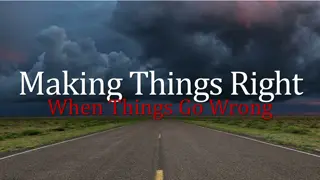Managing Stress and Anger Effectively
In this educational setting, tasks related to mental health and emotional well-being are outlined and assigned for students. The agenda covers topics on stress and anger management strategies, vocabulary tests, and unit reviews. Students are encouraged to actively participate in group activities and class discussions to enhance their understanding of mental health concepts and prepare for upcoming tests.
Download Presentation

Please find below an Image/Link to download the presentation.
The content on the website is provided AS IS for your information and personal use only. It may not be sold, licensed, or shared on other websites without obtaining consent from the author.If you encounter any issues during the download, it is possible that the publisher has removed the file from their server.
You are allowed to download the files provided on this website for personal or commercial use, subject to the condition that they are used lawfully. All files are the property of their respective owners.
The content on the website is provided AS IS for your information and personal use only. It may not be sold, licensed, or shared on other websites without obtaining consent from the author.
E N D
Presentation Transcript
Write 1 thing you remember from each TED talk video 1. Understanding Mental Illness - 2. Schizophrenia Ellen Sachs 3. Depression Kevin Breel
Assignments Due: Mon August 20, 2018 Today s Agenda: 1. 1. Lesson 10 Vocab DUE TUESDAY 2. DAY Lesson 10 Vocab DUE TUESDAY 2. UNIT 2 TEST DAY UNIT 2 TEST on the BLOCK on the BLOCK 1. Warm-up 2. Stress and Anger Management Notes 3. Lesson 10 Vocab Essential Question: How can I healthfully manage stress and anger? Learning Target: I will be able to list and describe several stress and anger management strategies.
1 person from each group grab textbooks Get out your Unit 2 Notes packet Turn to page to page 95
If the statement is true write true If the statement is false CHANGE the italicized word to another vocabulary term to make it a true statement Some terms may be used more than once There are 6 true and 6 false statements If you do not finish in class, it is HOMEWORK, due tomorrow!! If you do not finish in class, it is HOMEWORK, due tomorrow!!
Turn in your lesson 10 vocab to the class basket BEFORE you start your warm-up! WITHOUT USING YOUR NOTES: What are the 3 stages of the general adaptation syndrome? What happens at each stage?
Assignments Due: Tuesday August 21, 2018 Today s Agenda: 1. 2. 1. Lesosn10 DUE TODAY 2. UNIT 2 TEST ON THE BLOCK DAY Lesosn10 DUE TODAY UNIT 2 TEST ON THE BLOCK DAY 1. Warm-up 2. Trade and Grade Lesson 10 Vocab 3. Mental Health Categories Puzzle 4. Pass back graded papers/ update Unit 2 Tracking Sheet Essential Question: What have I learned about mental-emotional health? Learning Target: I will review for the Unit 2 Test TOMORROW.
Work in your table groups Pick up your materials: One of each paper A pair of scissors A glue stick Cut out the boxes and put them together with their correct category YOU CAN NOT USE YOUR NOTES!!! Put all your names on the top and turn it in to the basket PLEASE PUT ALL SCRAPS OF PAPER OIN THE TRASH PLEASE PUT ALL SCRAPS OF PAPER OIN THE TRASH
B. Lesson 8/9 Vocab C. Lesson 10 Vocab 4 = 11-12 3 = 10 2 = 9 1 = 8 0 = 7 or less 4 = 15-16 3 = 13-14 2 = 12 1 = 11 0 = 10 or less
Wednesday/ Thursday
Anger-management Skills Serotonin Adrenaline Psychosomatic Disease 1. The response of the body to the demands of daily living is ________. 2. _________ is a specific feeling such as anger, sadness, happiness, or anxiety. 3. The second phase of the general adaptation syndrome is ________________. 4. Healthful ways to express your feelings when you are irritated or annoyed are called ___________________________. 5. ___________ is anger that is not recognized and is expressed in inappropriate ways. 6. The hormone that is secreted to prepare your body to react in times of stress or emergency is _________________. 7. ___________ is a chronic or constant state of anger. 8. A series of body changes that result from stress is called the _____________________. Resistance Stage Hostility Hidden Anger Exhaustion Stage Stress-Management Skills General Adaptation Syndrome Stress Emotion Mind-Body Connection Alarm Stage
Assignments Due: 1. Unit 2 Test - TODAY Wed/Thu August 21/22 2019 Today s Agenda: 1. Warm-up 2. Unit 2 Test 3. Unit 3 Pre-test 4. Begin Family Social Notes Essential Question: What have I learned about mental/emotional health? Learning Target: I will assess what I have learned by taking the Unit 2 Test.
Make sure you know the following: The Good character traits Personality vs Personality Type Categories of mental disorders and examples Anger management strategies Stages of the general adaptation syndrome Stress management strategies
Fill out the top of your bubble sheet Name Class Date Quiz 8/22/19 Unit 2 Test 4th Hour When you are done with your Unit 2 Test, turn it in and complete the pre-test for Unit 3
A. Pre-test 4 =10 3 = 8-9 2 = 6-7 1 = 5 0 = 4 or less
The basic unit of society is FAMILY Can include parents, brothers, sisters, aunts, uncles, grandparents, cousins, nephews, nieces, step- parents, step-brothers, or step-sisters
A HEALTHFUL FAMILY is a family that practices skills that promote loving, responsible relationships Have a positive effect on physical and emotional health
Skills such as: Self-respect Effective communication Values Coping skills Healthful attitudes Decision making skills Work ethic
A DYSFUNCTIONAL FAMILY is a family that does NOT promote loving, responsible relationships Dysfunction can be caused by many different problems, such as
1 Chemical dependence (drug addiction) Causes changes in behavior Increased risk for violence
2 Other addictions in the family Eating disorders, gambling addiction, workaholism, etc. Family life is neglected May lead to codependence
3 Perfectionism in the family Goes beyond having high standards Parents are overly critical Children feel inadequate and insecure Can lead to self-destructive behavior
4 Violence in the family The use of force to injure, damage, or destroy oneself, others, or property Domestic abuse Physicial, sexual, or emotional abuse used by one person in a relationship to control the other Victims often blame themselves
5 Physical Abuse in the family (also #1 type of abuse) Definition - Violent Treatment that results in physical injury to the victim Abuser is usually controlling and moody Abuser usually feels guilty and apologizes after the abuse
6 Emotional Abuse in the family (also #2 type of abuse) Definition: Belittling or verbally putting down another person Making a person feel worthless Withholding love and affection in order to cause pain
7 Neglect (also #3 type of abuse) Definition: The inability or unwillingness of a parent, guardian or custodian of a child to provide that child with supervision, food, clothing, shelter or medical care if that inability or unwillingness causes unreasonable risk of harm to the child's health or welfare
8 Sexual Abuse (also #4 type of abuse) Definition: Any sexual contact that is forced on another person, either through physical force, manipulation, or threats of harm Can include: Inflicting or allowing sexual abuse Sexual conduct with a minor Sexual assault Molestation of a child Commercial sexual exploitation of a minor Sexual exploitation of a minor Incest Child prostitution
9 Abandonment in the family When a person chooses to give up or refuses responsibility for those in his or her care Can be physical abandonment parent leaves the home Can be emotional abandonment parent is not available and is emotionally absent Causes children to feel hurt and confused
10 Mental Disorders in the family A Family member with a mental disorder can cause additional stress for the family Family members may not be understanding and may not respond to the disorder in a supportive, helpful way
Codependent Relationships A problem when one person in a relationship neglect themselves to try to care for, control, or fix someone else Codependence is DYSFUNCTIONAL People who are codependent have trouble with intimacy INTAMACY a deep and meaningful kind of sharing between two people
Codependents avoid intimacy They may choose relationships that offer little or no chance for closeness Codependence Scale Enmeshment 100% Enmeshment 100% Interdependence 0% Interdependence 0%
Enmeshment a condition in which a person becomes obsessed with the needs of another person and can no longer recognize their own needs Interdependence a condition in which two people depend on each other, yet each maintains their own separate identity
Without looking at your notes, try to list all 10 causes of dysfunction in families that we listed in our notes last week.
Assignments Due: 1. Lesson 13/15 Vocab DUE MONDAY, 8/26 2. Marriage Interview due Friday 8/30 Fri August 23, 2019 Today s Agenda: 1. Warm-up/ collect warm-ups 2. Pass out Marriage Interview Assignment 3. Read Lesson 15 4. Lesson 13/15 vocabulary Essential Question: How can I improve or maintain relationships using conversation skills? Learning Target: I will be able to list several conversation keepers and killers .
DUE NEXT FRIDAY, August 30th Can be done in person or over the phone Must be someone that has been married a minimum of 5 years
4th person in each row, grab textbooks for your row Turn to page 159 Get out your Unit 3 Notes
Complete BOTH sides Lesson 13 starts on page 135 Lesson 15 starts on page 159 If you finish in class, turn it in to the class basket If you do not finish in class, it is HOMEWORK DUE MONDAY, 8/26
